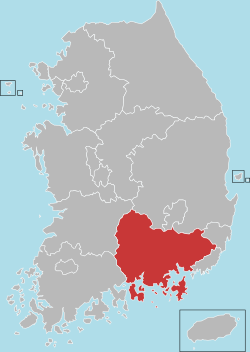Geochang County
Geochang Country (Geochang-gun, Korean pronunciation: [kʌtɕʰaŋɡun]) is a county in South Gyeongsang Province, South Korea. The Geochang International Festival of Theater, which was started in 1989, is renowned as the best play festival in Korea. The District Office is located in Geochang-eup, and has jurisdiction over 1 eup and 11 myeon.
Geochang 거창군 | |
|---|---|
County | |
| Korean transcription(s) | |
| • Hangul | 거창군 |
| • Hanja | 居昌郡 |
| • Revised Romanization | Geochang-gun |
| • McCune-Reischauer | Kŏch'ang-gun |
 Emblem of Geochang | |
 Location in South Korea | |
| Country | |
| Region | Yeongnam |
| Administrative divisions | 1 eup, 11 myeon |
| Area | |
| • Total | 804.09 km2 (310.46 sq mi) |
| Population (2019.02) | |
| • Total | 62,342 |
| • Density | 77.5/km2 (201/sq mi) |
| • Dialect | Gyeongsang |
The origin of Geochang's name[1]
Geocheang Country (Geochang-gun, Korean pronunciation) has been called Geoyeol, Geota and Arim since ancient times, in the meaning of a large bright place, a very wide field, a wide field, or a large bright one. It was first called a Geochang in the 16th year of King Gyeongdeok of Silla in 757 and was called a geochang after being divided and annexed by surrounding cities.
History
- At the beginning of the Shilla Dynasty was referred to as Gayeol.
- 1896 Gyeongsangnam-do, Geochang-gun
- 1928 Gadong-myeon and Gaseo-myeon consolidated into Gajo-myeon.
- 1931 Eupwoe-myeon renamed to Wolcheon-myeon.
- 1937 Geochang-myeon elevated to Geochang-eup.
- 1957 Wolcheon-myeon consolidated into Geochang-eup.
Festivals
- Keochang International Festival of Theatre (KIFT)
In Korea, it is called the four major theatrical festivals along with Ansan street Arts Festival, Puppet Festival Chuncheon,[2] and Andong Maskdance Festival.
It is an international theater festival that is held every July and August under the theme of "Nature, Humanity, and Drama".
Twin towns – sister cities
Geochang is twinned with:






Climate
| Climate data for Geochang (1981–2010) | |||||||||||||
|---|---|---|---|---|---|---|---|---|---|---|---|---|---|
| Month | Jan | Feb | Mar | Apr | May | Jun | Jul | Aug | Sep | Oct | Nov | Dec | Year |
| Average high °C (°F) | 5.0 (41.0) |
7.5 (45.5) |
12.7 (54.9) |
19.6 (67.3) |
24.2 (75.6) |
27.2 (81.0) |
29.3 (84.7) |
29.8 (85.6) |
25.8 (78.4) |
21.0 (69.8) |
14.0 (57.2) |
7.7 (45.9) |
18.7 (65.7) |
| Daily mean °C (°F) | −1.7 (28.9) |
0.5 (32.9) |
5.4 (41.7) |
11.8 (53.2) |
16.7 (62.1) |
20.9 (69.6) |
24.0 (75.2) |
24.2 (75.6) |
19.2 (66.6) |
12.5 (54.5) |
6.1 (43.0) |
0.4 (32.7) |
11.7 (53.1) |
| Average low °C (°F) | −7.5 (18.5) |
−5.6 (21.9) |
−1.1 (30.0) |
4.3 (39.7) |
9.6 (49.3) |
15.3 (59.5) |
20.0 (68.0) |
20.2 (68.4) |
14.2 (57.6) |
6.1 (43.0) |
−0.3 (31.5) |
−5.6 (21.9) |
5.8 (42.4) |
| Average precipitation mm (inches) | 27.9 (1.10) |
37.5 (1.48) |
55.1 (2.17) |
75.4 (2.97) |
94.9 (3.74) |
174.2 (6.86) |
301.4 (11.87) |
284.8 (11.21) |
166.0 (6.54) |
44.3 (1.74) |
35.9 (1.41) |
19.2 (0.76) |
1,316.8 (51.84) |
| Average precipitation days (≥ 0.1 mm) | 5.5 | 5.7 | 7.3 | 8.0 | 8.4 | 9.7 | 14.6 | 13.5 | 8.3 | 5.2 | 6.2 | 4.9 | 97.3 |
| Average relative humidity (%) | 64.7 | 63.0 | 61.9 | 60.7 | 66.2 | 72.0 | 79.3 | 79.4 | 77.6 | 72.8 | 69.3 | 67.0 | 69.5 |
| Mean monthly sunshine hours | 193.1 | 191.9 | 216.3 | 233.1 | 244.2 | 203.3 | 176.6 | 183.0 | 172.0 | 200.7 | 174.6 | 182.4 | 2,373.7 |
| Source: Korea Meteorological Administration[3] | |||||||||||||
Geography
- Geochang-gun is situated at the far west side of Gyeongsangnam-do, and faces Gyeongsangbuk-do and Jeollanam-do. It does not have good transportation access.
Administrative Regions
The administrative region of Geochang-gun is made up of Geochang-eup, and 11 myeons. With an area of 804.14 km2, it occupies 7.65% of Gyeongsangnam-do. As of August 2012, it has a population of 27,111 households, or 63,122 people, with 62.4% residing in Geochang-eup. Its highest ever population was 125,995, which was much higher than present day Changwon-si.
| Eup/myeon | Hanja | Number of households | Population | Area |
|---|---|---|---|---|
| Geochang-eup | 居昌邑 | 16,536 | 40,746 | 56.00 |
| Joosang-myeon | 主尙面 | 857 | 1,655 | 50.01 |
| Woongyang-myeon | 熊陽面 | 1,016 | 2,026 | 58.47 |
| Goje-myeon | 高梯面 | 807 | 1,560 | 58.47 |
| Buksang-myeon | 北上面 | 876 | 1,652 | 125.30 |
| Wuicheon-myeon | 渭川面 | 1,096 | 2,162 | 54.75 |
| Mari-myeon | 馬利面 | 1,166 | 2,150 | 46.62 |
| Namsang-myeon | 南上面 | 1,324 | 2,613 | 68.51 |
| Namha-myeon | 南下面 | 828 | 1,528 | 49.83 |
| Sinwon-myeon | 神院面 | 886 | 1,590 | 73.71 |
| Gajo-myeon | 加祚面 | 2,039 | 3,920 | 66.15 |
| Gabuk-myeon | 加北面 | 831 | 1,455 | 96.25 |
| Geochang-gun | 居昌郡 | 28,262 | 63,057 | 804.07 |
See also
References
- "The origin of Geochang's name".
- cocobau.com http://cocobau.com/. Retrieved 2019-03-16. Missing or empty
|title=(help) - "평년값자료(1981–2010) 거창(284)". Korea Meteorological Administration. Retrieved 2011-05-07.
